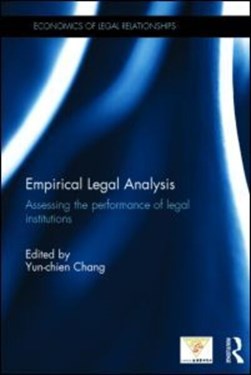-
BROWSE 1000s OF BOOKS IN STOCK
-
FREE DELIVERY ON ORDERS OVER €10
Empirical legal analysis
Hardback
Series: See all books in this series
This innovative volume explores empirical legal issues around the world. While legal studies have traditionally been worked on and of letters and with a normative bent, in recent years quantitative methods have gained traction by offering a brand new perspective of understanding law. That is, legal scholars have started to crunch numbers, not letters, to tease out the effects of law on the regulated industries, citizens, or judges in reality. In this edited book, authors from leading institutions in the U.S., Europe, and Asia investigate legal issues in South Africa, Argentina, the U.S., Israel, Taiwan, and other countries. Using original data in a variety of statistical tools (from the most basic chi-square analysis to sophisticated two-stage least square regression models), contributors to this book look into the judicial behaviours in Taiwan and Israel, the determinants of constitutional judicial systems in 100 countries, and the effect of appellate court decisions on media competition. In addition, this book breaks new ground in informing important policy debates. Specifically, how long should we incarcerate criminals? Should the medical malpractice liability system be reformed? Do police reduce crime? Why is South Africa's democratic transition viable? With solid data as evidence, this volume sheds new light on these issues from a road more and more frequently taken-what is known as "empirical legal studies/analysis." This book should be useful to students, practitioners and professors of law, economics and public policy in many countries who seek to understand their legal system from a different, and arguably more scientific, perspective.
€217.50

652 Reward Points
In stock online
Extended Range: Delivery in 2-3 working days
Extended Range: Delivery in 2-3 working days
Free Delivery on this item
Any purchases for more than €10 are eligible for free delivery anywhere in the UK or Ireland!
This innovative volume explores empirical legal issues around the world. While legal studies have traditionally been worked on and of letters and with a normative bent, in recent years quantitative methods have gained traction by offering a brand new perspective of understanding law. That is, legal scholars have started to crunch numbers, not letters, to tease out the effects of law on the regulated industries, citizens, or judges in reality. In this edited book, authors from leading institutions in the U.S., Europe, and Asia investigate legal issues in South Africa, Argentina, the U.S., Israel, Taiwan, and other countries. Using original data in a variety of statistical tools (from the most basic chi-square analysis to sophisticated two-stage least square regression models), contributors to this book look into the judicial behaviours in Taiwan and Israel, the determinants of constitutional judicial systems in 100 countries, and the effect of appellate court decisions on media competition. In addition, this book breaks new ground in informing important policy debates. Specifically, how long should we incarcerate criminals? Should the medical malpractice liability system be reformed? Do police reduce crime? Why is South Africa's democratic transition viable? With solid data as evidence, this volume sheds new light on these issues from a road more and more frequently taken-what is known as "empirical legal studies/analysis." This book should be useful to students, practitioners and professors of law, economics and public policy in many countries who seek to understand their legal system from a different, and arguably more scientific, perspective.

652 Reward Points
Any purchases for more than €10 are eligible for free delivery anywhere in the UK or Ireland!
€217.50

652 Reward Points
Any purchases for more than €10 are eligible for free delivery anywhere in the UK or Ireland!
Series: See all books in this series
Product Description
This innovative volume explores empirical legal issues around the world. While legal studies have traditionally been worked on and of letters and with a normative bent, in recent years quantitative methods have gained traction by offering a brand new perspective of understanding law. That is, legal scholars have started to crunch numbers, not letters, to tease out the effects of law on the regulated industries, citizens, or judges in reality. In this edited book, authors from leading institutions in the U.S., Europe, and Asia investigate legal issues in South Africa, Argentina, the U.S., Israel, Taiwan, and other countries. Using original data in a variety of statistical tools (from the most basic chi-square analysis to sophisticated two-stage least square regression models), contributors to this book look into the judicial behaviours in Taiwan and Israel, the determinants of constitutional judicial systems in 100 countries, and the effect of appellate court decisions on media competition. In addition, this book breaks new ground in informing important policy debates. Specifically, how long should we incarcerate criminals? Should the medical malpractice liability system be reformed? Do police reduce crime? Why is South Africa's democratic transition viable? With solid data as evidence, this volume sheds new light on these issues from a road more and more frequently taken-what is known as "empirical legal studies/analysis." This book should be useful to students, practitioners and professors of law, economics and public policy in many countries who seek to understand their legal system from a different, and arguably more scientific, perspective.
Product Details
ISBN9780415714440
FormatHardback
PublisherROUTLEDGE (03 December. 2013)
No. of Pages0
Weight680
Language English
Dimensions 234 x 156 x 28

